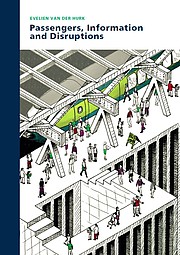Passengers, Information, and Disruptions Defended on Thursday, 18 June 2015
Passengers traveling in public transport generate a detailed digital track record of their journey through using automated fare collection systems and carrying mobile devices. This information on passenger behavior has only recently become available to public transport operators. This thesis addresses the question how this new information can be used to improve passenger service in case of disruptions in public transportation.
Major disruptions cause the current logistical schedule of the operator to be infeasible. Adjusting this schedule to the disruption is a complicated planning problem. Passengers will adjust their journeys to the new schedule, and may need to adjust their route choice due to the route choice of other passengers in case of capacity shortages. Therefore the passenger service results from a complex interaction between passengers themselves, and between passengers and the schedule.
This thesis proposes new models for improving passenger service in case of major disruptions by adjusting the schedule while anticipating passenger’s reactions, and also by supporting passengers during disruptions through the provision of route advice. This research is combined with a study on passenger behavior based on the new data sources. The models are evaluated using data and case studies of the passenger rail network of Netherlands Railways and the urban rail network of the Massachusetts Bay Transportation Authority. It was found that indeed this new information, together with the option to provide route advice to passengers, could significantly improve service during major disruptions.
Keywords
Disruption Management, Public Transport, Railway, Passenger, Information, Smart Card Data, Rolling Stock Rescheduling, Combinatorial Optimization, Line Planning, Netherlands Railways, Massachusetts Bay Transportation Authority, Shuttle Buses














